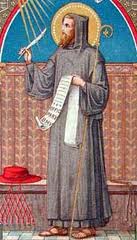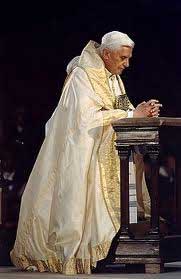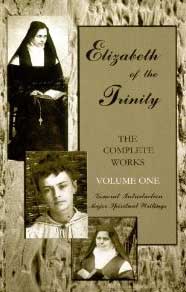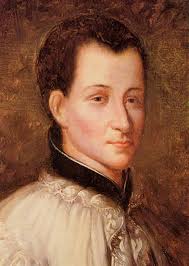Saint Peter Damian
from Vatican.va
Dear Brothers and Sisters,
During the Catecheses of these Wednesdays I am commenting on several important people in the life of the Church from her origins. Today I would like to reflect on one of the most significant figures of the 11th century, St Peter Damian, a monk, a lover of solitude and at the same time a fearless man of the Church, committed personally to the task of reform, initiated by the Popes of the time. He was born in Ravenna in 1007, into a noble family but in straitened circumstances. He was left an orphan and his childhood was not exempt from hardships and suffering, although his sister Roselinda tried to be a mother to him and his elder brother, Damian, adopted him as his son. For this very reason he was to be called Piero di Damiano, Pier Damiani [Peter of Damian, Peter Damian]. He was educated first at Faenza and then at Parma where, already at the age of 25, we find him involved in teaching. As well as a good grounding in the field of law, he acquired a refined expertise in the art of writing the ars scribendi and, thanks to his knowledge of the great Latin classics, became “one of the most accomplished Latinists of his time, one of the greatest writers of medieval Latin”
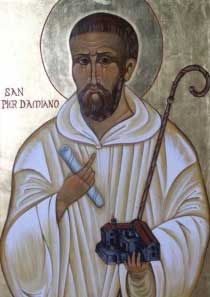 He distinguished himself in the widest range of literary forms: from letters to sermons, from hagiographies to prayers, from poems to epigrams. His sensitivity to beauty led him to poetic contemplation of the world. Peter Damian conceived of the universe as a never-ending “parable” and a sequence of symbols on which to base the interpretation of inner life and divine and supra-natural reality. In this perspective, in about the year 1034, contemplation of the absolute of God impelled him gradually to detach himself from the world and from its transient realties and to withdraw to the Monastery of Fonte Avellana. It had been founded only a few decades earlier but was already celebrated for its austerity. For the monks’ edification he wrote the Life of the Founder, St Romuald of Ravenna, and at the same time strove to deepen their spirituality, expounding on his ideal of eremitic monasticism.
He distinguished himself in the widest range of literary forms: from letters to sermons, from hagiographies to prayers, from poems to epigrams. His sensitivity to beauty led him to poetic contemplation of the world. Peter Damian conceived of the universe as a never-ending “parable” and a sequence of symbols on which to base the interpretation of inner life and divine and supra-natural reality. In this perspective, in about the year 1034, contemplation of the absolute of God impelled him gradually to detach himself from the world and from its transient realties and to withdraw to the Monastery of Fonte Avellana. It had been founded only a few decades earlier but was already celebrated for its austerity. For the monks’ edification he wrote the Life of the Founder, St Romuald of Ravenna, and at the same time strove to deepen their spirituality, expounding on his ideal of eremitic monasticism.
One detail should be immediately emphasized: the Hermitage at Fonte Avellana was dedicated to the Holy Cross and the Cross was the Christian mystery that was to fascinate Peter Damian more than all the others. “Those who do not love the Cross of Christ do not love Christ”, he said (Sermo XVIII, 11, p. 117); and he described himself as “Petrus crucis Christi servorum famulus Peter, servant of the servants of the Cross of Christ” (Ep, 9, 1). Peter Damian addressed the most beautiful prayers to the Cross in which he reveals a vision of this mystery which has cosmic dimensions for it embraces the entire history of salvation: “O Blessed Cross”, he exclaimed, “You are venerated, preached and honoured by the faith of the Patriarchs, the predictions of the Prophets, the senate that judges the Apostles, the victorious army of Martyrs and the throngs of all the Saints” (Sermo XLVII, 14, p. 304). Dear Brothers and Sisters, may the example of St Peter Damian spur us too always to look to the Cross as to the supreme act God’s love for humankind of God, who has given us salvation.
This great monk compiled a Rule for eremitical life in which he heavily stressed the “rigour of the hermit”: in the silence of the cloister the monk is called to spend a life of prayer, by day and by night, with prolonged and strict fasting; he must put into practice generous brotherly charity in ever prompt and willing obedience to the prior. In study and in the daily meditation of Sacred Scripture, Peter Damian discovered the mystical meaning of the word of God, finding in it nourishment for his spiritual life. In this regard he described the hermit’s cell as the “parlour in which God converses with men”. For him, living as a hermit was the peak of Christian existence, “the loftiest of the states of life” because the monk, now free from the bonds of worldly life and of his own self, receives “a dowry from the Holy Spirit and his happy soul is united with its heavenly Spouse” (Ep 18, 17; cf. Ep 28, 43 ff.). This is important for us today too, even though we are not monks: to know how to make silence within us to listen to God’s voice, to seek, as it were, a “parlour” in which God speaks with us: learning the word of God in prayer and in meditation is the path to life.
Tags: catholic, catholic podcast, catholic prayer, cathollc spirituality, doctor of the church, hermit, Peter Damian, Pier Damiani, saint peter damian
This entry was posted on Tuesday, February 21st, 2012 at 12:05 am
You can follow any responses to this entry through the RSS 2.0 feed.
Here is the book for Lent (and any other time of the year for that matter), “Simplifying Your Soul:  Lenten Practices to Renew Your Spirit”  is “simply” wonderful!  Paula Huston has such a gentle way of helping us to  penetrate into what our hearts so we can draw closer to what we truly long for…a deeper relationship with God…the Father, the Son and the Holy Spirit.  A benedictine oblate, Paula, draws from the best of the monastic traditions and helps us to apply those practices in our modern day circumstances.  I have to believe that Sts. Benedict and Scholastic would be overjoyed how this 21 century daughter of the church as responded to their initial teachings  offered so a long ago.  NOT TO BE MISSED…HIGHLY RECOMMENDED!
is “simply” wonderful!  Paula Huston has such a gentle way of helping us to  penetrate into what our hearts so we can draw closer to what we truly long for…a deeper relationship with God…the Father, the Son and the Holy Spirit.  A benedictine oblate, Paula, draws from the best of the monastic traditions and helps us to apply those practices in our modern day circumstances.  I have to believe that Sts. Benedict and Scholastic would be overjoyed how this 21 century daughter of the church as responded to their initial teachings  offered so a long ago.  NOT TO BE MISSED…HIGHLY RECOMMENDED!
[powerpress]
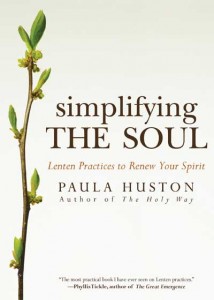 You can find it here
You can find it here
“Too often thought of as simply a season of sacrifice, Lent is revealed here as something far richer–a privileged time to experience God in your everyday life, to open yourself to conversion, and to savor God’s transforming love.”–Rev. James Martin, S.J., Author of The Jesuit Guide to (Almost) Everything
Tags: catholic, catholic podcast, catholic prayer, cathollc spirituality
This entry was posted on Monday, February 20th, 2012 at 6:13 pm
You can follow any responses to this entry through the RSS 2.0 feed.
Episode 6- The School of Prayer: Reflections on the teachings of Pope Benedict XVI –  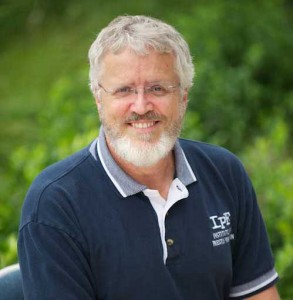 What is the authentic understanding of “conversion” in the context of prayer.  Deacon Keating discusses the reflection offered by the Holy Father of  the encounter of Elijah with prophets of Baal.
What is the authentic understanding of “conversion” in the context of prayer.  Deacon Keating discusses the reflection offered by the Holy Father of  the encounter of Elijah with prophets of Baal.
[powerpress]
Deacon James Keating, PhD, the director of Theological Formation for the Institute for Priestly Formation, located at Creighton University, in Omaha.
From  Pope Benedict’s 6 audience on prayer:
“Firstly”, he said, “is the priority of the first commandment of God’s Law: having no god but God. When God disappears man falls into slavery, into idolatry, as has happened in our time under totalitarian regimes and with the various forms of nihilism which make man dependent on idols and idolatry, which enslave”. Secondly, he continued, “the main objective of prayer is conversion: the fire of God which transforms our hearts and makes us capable of seeing God and living for Him and for others”. Thirdly, “the Church Fathers tell us that this story is … a foretaste of the future, which is Christ. It is a step on the journey towards Christ”.
For more information on the “Institute of Priestly Formation†and for other material available by Deacon Keating, just click here
Don’t forget to pickup a copy of “Communion with Christ†, it is one of the best audio sets on prayer…ever!
Check out Deacon Keating’s “Discerning Heart†page
Tags: catholic, catholic podcast, catholic prayer, cathollc spirituality, creighton university, institute for priestly formation, pope benedict xvi
This entry was posted on Monday, February 20th, 2012 at 10:44 am
You can follow any responses to this entry through the RSS 2.0 feed.
[powerpress]Msgr. Esseff teaches the importance of the Liturgical year and in particular the season of Lent.  He also shares his experience of fasting in a desert found in Peru. From this he learned the importance of FASTING and PRAYER.  Msgr. Esseff challenges us to discern what the Father in Heaven is asking us to do this Lent  through fasting, so we can purely and perfectly follow His Holy Will.  And he describes ALMSGIVING, and story from an experience he had with Mother Teresa’s Missionaries of Charity Sisters.
through fasting, so we can purely and perfectly follow His Holy Will.  And he describes ALMSGIVING, and story from an experience he had with Mother Teresa’s Missionaries of Charity Sisters.
The Church prepares a spiritual retreat for all of us during Lent. Â The Holy Spirit is transforming you in a radical way so that you become more like Jesus Christ…the day by day exercise of Morning Prayer, the Eucharist and Evening Prayer, Fasting and Almsgiving, and the other moments of contemplative prayer aids in the transformation…our ego decreases and Jesus increases in our minds and in our hearts.
Be sure to visit Msgr. Esseff’s website “Building A Kingdom of Love”
Pray the Liturgy of Hours
Tags: almsgiving, catholic, catholic podcast, catholic prayer, cathollc spirituality, Esseff, John Esseff, lent, mother teresa
This entry was posted on Sunday, February 19th, 2012 at 7:01 pm
You can follow any responses to this entry through the RSS 2.0 feed.
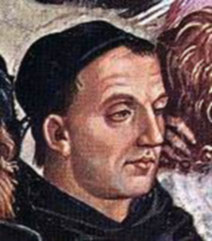 Pope John Paul IIÂ beatified Fra Angelico on October 3, 1982 and in 1984 declared him patron of Catholic artists.
Pope John Paul IIÂ beatified Fra Angelico on October 3, 1982 and in 1984 declared him patron of Catholic artists.
Angelico was reported to say “He who does Christ’s work must stay with Christ always”. This motto earned him the epithet “Blessed Angelico”, because of the perfect integrity of his life and the almost divine beauty of the images he painted, to a superlative extent those of the Blessed Virgin Mary.—Pope John Paul II
Fra Angelico (c. 1395 – February 18, 1455), born Guido di Pietro, was an Early Italian Renaissance painter described by Vasari in his Lives of the Artists as having “a rare and perfect talent”.   He was known to his contemporaries as Fra Giovanni da Fiesole (Brother John from Fiesole) and by Vasari as Fra Giovanni Angelico (Brother John the Angelic One).
Fra Angelico is known in Italy as il Beato Angelico, the term “Il Beato” (“Blessed One”) being already in use during his lifetime or shortly thereafter, in reference to his skills in painting religious subjects. Fiesole is sometimes misinterpreted as being part of his formal name, but it was merely the name of the town where he took his vows as a Dominican friar, and was used by contemporaries to separate him from other Fra Giovannis. He is listed in the Roman Martyrology as Beatus Ioannes Faesulanus, cognomento Angelicus—”Blessed Giovanni of Fiesole, nicknamed Angelico”.
Vasari wrote of Fra Angelico:
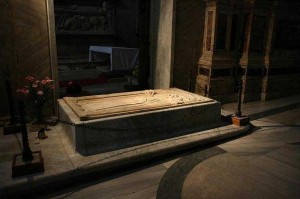
Fra Angelico, Patron Saint of Artists, is buried in the medieval church Santa Maria sopra Minerva, in Rome
But it is impossible to bestow too much praise on this holy father, who was so humble and modest in all that he did and said and whose pictures were painted with such facility and piety.
Tags: catholic, catholic podcast, catholic prayer, cathollc spirituality, sacred art
This entry was posted on Saturday, February 18th, 2012 at 8:37 am
You can follow any responses to this entry through the RSS 2.0 feed.
“The Work of Mercy: Being the Hands and Heart of Christ” is the latest from  Mark Shea. 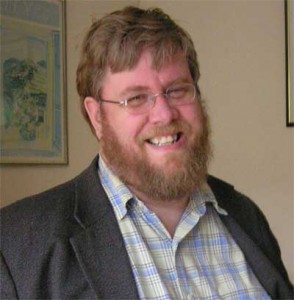  There’s no one who articulates Catholic teaching quite the way Mark does…it’s clear, engaging, entertaining and targeted to challenge the lukewarm heart.  His new book is an important contribution to our understanding of Catholic Social Teaching as expressed through the Corporal and Spiritual Works of Mercy….EXCELLENT. Highly recommended!
 There’s no one who articulates Catholic teaching quite the way Mark does…it’s clear, engaging, entertaining and targeted to challenge the lukewarm heart.  His new book is an important contribution to our understanding of Catholic Social Teaching as expressed through the Corporal and Spiritual Works of Mercy….EXCELLENT. Highly recommended!
[powerpress]
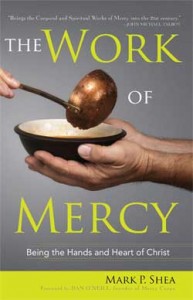 You can find the book here
You can find the book here
Brings the Corporal and Spiritual Works of Mercy into the 21st century. —JOHN MICHAEL TALBOT, musician and author
In this engaging, entertaining book, Mark Shea helps us rediscover what Christians have practiced for centuries–the corporal and spiritual works of mercy. —JIMMY AIKIN, senior apologist, Catholic Answers
Visit Mark’s blog at “Catholic and Enjoying It“
Tags: catholic, catholic podcast, catholic prayer, catholic social teaching, cathollc spirituality, Mark Shea, MICHAEL TALBOT
This entry was posted on Friday, February 17th, 2012 at 12:55 am
You can follow any responses to this entry through the RSS 2.0 feed.
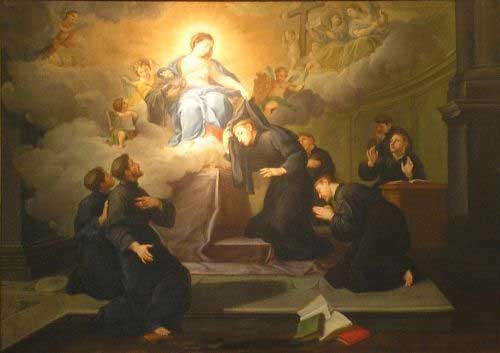
Today is the Church remembers the Seven Founders of the Order of Servites from the 13th Century.
In the mid-13th Century, morals were low and religion seemed nearly meaningless in the political city of Florence. In 1223, seven men from that city decided to form into a small group and go off to a silent place to serve God direct. The Order was founded that day on the Feast of the Assumption as Mary appeared to the seven men. Two of them were widowers and two were still married and brought their families to live together in faith.
They meant to live in solitude, but the group was continually disturbed by visitors. They all left Florence and went to Monte Senario. In 1244, under the direction of St. Peter of Verona, O.P., this group adopted a religious habit similar to the Dominicans and chose to live in accord with the Rule of St. Augustine. They adopted the name of the Servants of Mary.
The men were beatified on December 1, 1717 and canonized in 1887. The original founders were the following:
Saint Alexis Falconieri
Saint Bartholomew degli Amidei
Saint Benedict dell’Antella
Saint Buonfiglio Monaldi
Saint Gherardino Sostegni
Saint Hugh dei Lippi-Uguccioni
Saint John Buonagiunta Monetti
Tags: catholic, catholic podcast, catholic prayer, cathollc spirituality, order of servites, servants of mary, servites
This entry was posted on Friday, February 17th, 2012 at 12:14 am
You can follow any responses to this entry through the RSS 2.0 feed.
[powerpress]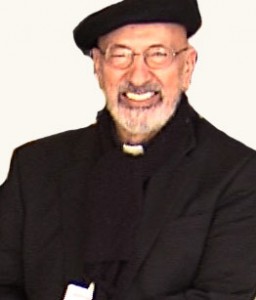 Msgr. Esseff teaches the importance of the Liturgy of Hours. He breaks open each portion of Morning Prayer. The Hymn, the psalm, the canticle, again the psalm … we sing praise to God with this section of Morning Prayer. Then God speaks to us in the reading. Then we respond to
Msgr. Esseff teaches the importance of the Liturgy of Hours. He breaks open each portion of Morning Prayer. The Hymn, the psalm, the canticle, again the psalm … we sing praise to God with this section of Morning Prayer. Then God speaks to us in the reading. Then we respond to  with the a short psalm. Then he helps us to appreciate the power of the Benedictus. That is followed by the intentions of the Church. Concluding with the great Our Father. We then bless the Lord and give Him thanks. Jesus unites the world in our prayer of praise to the Father when we enter into the Divine Office.
with the a short psalm. Then he helps us to appreciate the power of the Benedictus. That is followed by the intentions of the Church. Concluding with the great Our Father. We then bless the Lord and give Him thanks. Jesus unites the world in our prayer of praise to the Father when we enter into the Divine Office.
Be sure to visit Msgr. Esseff’s website “Building A Kingdom of Love”
Pray the Liturgy of Hours
Tags: catholic, catholic podcast, catholic prayer, cathollc spirituality, Esseff, John Esseff, morning prayer
This entry was posted on Thursday, February 16th, 2012 at 6:30 pm
You can follow any responses to this entry through the RSS 2.0 feed.
Episode 5 The Daily Prayer of Discernment: The Ignatian Wisdom of the Examen Prayer with Fr. Timothy Gallagher.
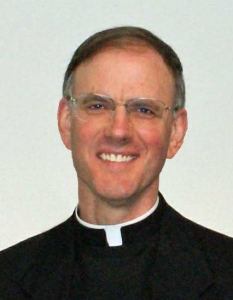 Fr. Gallagher continues to discuss the third step – REVIEW – which is where the “The Discernment of Spirits” intersects with “The Examen”. Â Then we approach the fourth step – FORGIVENESS – which is what all the actions in the prayer are leading to.
Fr. Gallagher continues to discuss the third step – REVIEW – which is where the “The Discernment of Spirits” intersects with “The Examen”. Â Then we approach the fourth step – FORGIVENESS – which is what all the actions in the prayer are leading to.
[powerpress]
As outlined from the Spiritual Exercises of St. Ignatius of Loyola
(translated from the autograph by Fr. E. Mullan, S.J. Â 1909Â in the public domain)
METHOD FOR MAKING THE GENERAL EXAMEN
It contains in it five Points.First Point. The first Point is to give thanks to God our Lord for the benefits received.
Second Point. The second, to ask grace to know our sins and cast them out.
Third Point. The third, to ask account of our soul from the hour that we rose up to the present Examen, hour by hour, or period by period: and first as to thoughts, and then as to words, and then as to acts, in the same order as was mentioned in the Particular Examen.
Fourth Point. The fourth, to ask pardon of God our Lord for the faults.
Fifth Point. The fifth, to purpose amendment with His grace.OUR FATHER.
Father Timothy M. Gallagher, O.M.V., was ordained in 1979 as a member of the Oblates of the Virgin Mary, a religious community dedicated to retreats and spiritual formation according to the Spiritual Exercises of St. Ignatius. Â Fr. Gallagher is featured on the EWTN series “Living the Discerning Life: Â The Spiritual Teachings of St. Ignatius of Loyola”. Â For more information on books and audio available for purchase from Fr. Timothy Gallagher check out his website: www.frtimothygallagher.org
For the other episodes in this series check out
Fr. Timothy Gallagher’s “Discerning Hearts†page
Tags: catholic, catholic podcast, catholic prayer, cathollc spirituality, discernment of spirits, Timothy Gallagher
This entry was posted on Thursday, February 16th, 2012 at 7:07 am
You can follow any responses to this entry through the RSS 2.0 feed.
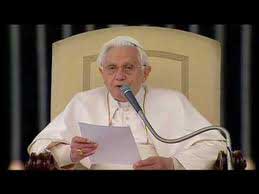 Vatican City, 15 February 2012 Vatican Radio-
Vatican City, 15 February 2012 Vatican Radio-
In his catechesis in Italian, to a packed Paul VI audience hall, the Holy Father said “In our school of prayer last week I spoke about Christ’s prayer on the Cross, taken from Psalm 22 “My God, my God why have you forsaken me”. Now I would like to continue to meditate on the prayers of Jesus on the cross in the imminence of death and today I would like to focus on the narrative that we encounter in the Gospel of St. Luke. The Evangelist has handed down three words of Jesus on the cross, two of which – the first and third – are explicitly prayers to the Father. The second one consists of the promise made to the so-called good thief crucified with him, answering, in fact, the thief’s prayer, Jesus reassures him: “Truly I tell you today will be with me in Paradise” (Lk 23 , 43). The two prayers of the dying Jesus and the acceptance of the repentant sinner’s supplication to Him are suggestively entwined in Luke’s account. Jesus both prays to the Father and hears the prayer of this man who is often called latro poenitens, “the repentant thief.”
Let us dwell on these three prayers of Jesus. The first pronounced immediately after being nailed to the cross, while the soldiers are dividing his garments as sad reward of their service. In a way this gesture closes the process of crucifixion. St. Luke writes: “When they came to the place called the Skull, they crucified him and the criminals there, one on his right, the other on his left. [Then Jesus said, “Father, forgive them, they know not what they do.â€] They divided his garments by casting lots “(23.33 to 34). The first prayer that Jesus addresses to the Father is one of intercession: He asks forgiveness for his executioners. With this, Jesus in person carries out what he had taught in the Sermon on the Mount when he said: ” But to you who hear I say, love your enemies, do good to those who hate you ” (Lk 6:27) and also promised to those who can forgive, “then your reward will be great and you will be children of the Most High ” (v. 35). Now, from the cross, He not only forgives his executioners, but speaks directly to the Father interceding on their behalf.
This is attitude of Jesus’ finds a moving ‘imitation’ in the story of the stoning of St. Stephen, the first martyr. Stephen, in fact, coming to an end, “knelt down and cried with a loud voice:” Lord, do not hold this sin against them”. That said, he died “(Acts 7.60). It was his last word. The comparison of the prayer for forgiveness of Jesus and that of the martyr is significant. Stephen turns to the Risen Lord and calls for his murder – a gesture clearly defined by the expression “this sin” – is not imputed against those who stone him. Jesus addresses the Father on the cross and not only asks for forgiveness for his executioners, but also offers a reading of what is happening. In his words, in fact, the men who crucify him “know not what they do” (Luke 23:34). He gives that ignorance, “not knowing” as the reason for the request for forgiveness from the Father, for this ignorance leaves the way open to conversion, as is the case in the words that the centurion spoke at Jesus’ death: ” This man was innocent beyond doubt”(v. 47), he was the Son of God”. It is a consolation for all times and for all men that the Lord, both for those who really did not know – the killers – and those who knew and condemned him, gives ignorance as the reason for asking for forgiveness – he sees it as a door that can open us up to
repentance “(Jesus of Nazareth, II, 233).
The second prayer of Jesus on the cross as told by St. Luke is a word of hope, is His answer to the prayer of one of the two men crucified with Him. The good thief before Jesus returned to himself and repents, he feels himself to be before the Son of God, who reveals the Face of God, and prays: “Jesus, remember me when you come into your kingdom” (v. 42). The Lord’s answer to this prayer goes far beyond the supplication, he says: ” Amen, I say to you, today you will be with me in Paradise” (v. 43). Jesus is aware of entering directly into communion with the Father and of reopening the path for the man to God’s paradise. So through this response gives the firm hope that the goodness of God can touch us even at the last moment of life and that sincere prayer, even after a life of wrong, meets the open arms of the good Father who awaits the return of his son.
“no matter how hard the trial, difficult the problem, heavy the suffering, we never fall from the hands of Godâ€
Tags: catholic, catholic podcast, catholic prayer, cathollc spirituality, pope benedict xvi, prayer
This entry was posted on Wednesday, February 15th, 2012 at 10:05 pm
You can follow any responses to this entry through the RSS 2.0 feed.
[powerpress]Msgr. Esseff offers his second lesson in “Teach Us How To Pray”. 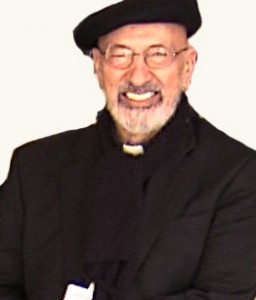  He speaks of the importance of Morning and Evening prayers in our lives.  The Holy Spirit inspires us to pray and the Church teaches prayer through the Liturgy of the Hours.
 He speaks of the importance of Morning and Evening prayers in our lives.  The Holy Spirit inspires us to pray and the Church teaches prayer through the Liturgy of the Hours.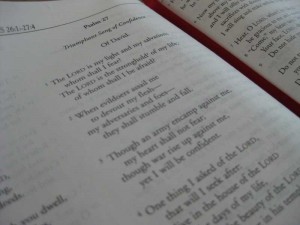  Msgr. Esseff goes on to teach on the Psalms.  Those who pray the psalms offer powerful praise to the Father. Who actually praises?  In the deepest level of our heart, it’s actually Jesus who praises the Father in us when we pray the Psalms and the Father loves us in return.  What is essential is that we listen to what God says to us in prayer…Listen.
 Msgr. Esseff goes on to teach on the Psalms.  Those who pray the psalms offer powerful praise to the Father. Who actually praises?  In the deepest level of our heart, it’s actually Jesus who praises the Father in us when we pray the Psalms and the Father loves us in return.  What is essential is that we listen to what God says to us in prayer…Listen.
Pray the Liturgy of Hours
Tags: catholic, catholic podcast, catholic prayer, cathollc spirituality
This entry was posted on Wednesday, February 15th, 2012 at 7:26 am
You can follow any responses to this entry through the RSS 2.0 feed.
Episode 6 Beginning to Pray: Â “Heaven in Faith” Â Day 3 Prayer 2 – “You have died and your life is hidden with Christ in God”
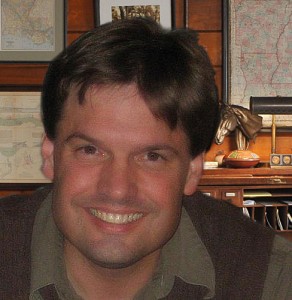
[powerpress]
Dr. Anthony Lilles is a Catholic husband and father of three teaching Spiritual Theology at St. John Vianney Theological Seminary. He  teaches spiritual theology and spiritual direction to transitional deacons, and the spiritual classics to the men who enter the Spirituality Year, a year of prayer in preparation for seminary formation.  He is the author of the “Beginning to Pray”  catholic blog spot.
From “Heaven in Faith: Day 3 Prayer 2” found in The Complete Works vol 1:
11. “You have died and your life is hidden with Christ in God” Â St. Paul comes to bring us a light to guide us on the pathway of the abyss. Â “You have died”! Â What does that mean but that the soul that aspires to live close to God “in the invincible fortress of holy recollection” must be “set apart, stripped, and withdrawn from all things” (in spirit). Â This soul “finds within itself a simple ascending movement of love to God, whatever creatures may do; it is invincible to things which” pass away, “for it transcends them, seeking God alone.”
For other episodes in the series visit the Discerning Hearts page for Dr. Anthony Lilles
We would like to offer heartfelt thanks to
Miriam Gutierrez for providing for us “the voice” of Blessed Elizabeth for this series
Tags: Anthony Lilles, blessed elizabeth of the trinity, carmelite, catholic, catholic podcast, catholic prayer, cathollc spirituality, heaven in faith, Spiritual Theology, St. John Vianney Theological Seminary
This entry was posted on Wednesday, February 15th, 2012 at 1:30 am
You can follow any responses to this entry through the RSS 2.0 feed.
Vatican News Service – CLAUDE LA COLOMBIÈRE, third child of the notary Bertrand La Colombière and Margaret Coindat, was born on 2nd February 1641 at St. Symphorien d’Ozon in the Dauphine, southeastern France. After the family moved to Vienne Claude began his early education there, completing his studies in rhetoric and philosophy in Lyon.
It was during this period that Claude first sensed his vocation to the religious life in the Society of Jesus. We know nothing of the motives which led to this decision. We do know, however, from one of his early notations, that he “had a terrible aversion for the life embraced”. This affirmation is not hard to understand by any who are familiar with the life of Claude, for he was very close to his family and friends and much inclined to the arts and literature and an active social life. On the other hand, he was not a person to be led primarily by his sentiments.
 Claude became noted for solid and serious sermons. They were ably directed at specific audiences and, faithful to their inspiration from the gospel, communicated to his listeners serenity and confidence in God. His published sermons produced and still produce significant spiritual fruits. Given the place and the short duration of his ministry, his sermons are surprisingly fresh in comparison with those of better-known orators.
Claude became noted for solid and serious sermons. They were ably directed at specific audiences and, faithful to their inspiration from the gospel, communicated to his listeners serenity and confidence in God. His published sermons produced and still produce significant spiritual fruits. Given the place and the short duration of his ministry, his sermons are surprisingly fresh in comparison with those of better-known orators.
On 2nd February 1675 he pronounced his solemn profession and was named rector of the College at Paray-le-Monial. Not a few people wondered at this assignment of a talented young Jesuit to such an out-of the-way place as Paray. The explanation seems to be in the superiors’ knowledge that there was in Paray an unpretentious religious of the Monastery of the Visitation, Margaret Mary Alacoque, to whom the Lord was revealing the treasures of his Heart, but who was overcome by anguish and uncertainty. She was waiting for the Lord to fulfill his promise and send her “my faithful servant and perfect friend” to help her realize the mission for which he had destined her: that of revealing to the world the unfathomable riches of his love.
After Father Colombière’s arrival and her first conversations with him, Margaret Mary opened her spirit to him and told him of the many communications she believed she had received from the Lord. He 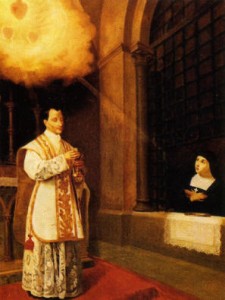 assured her he accepted their authenticity and urged her to put in writing everything in their regard, and did all he could to orient and support her in carrying out the mission received. When, thanks to prayer and discernment, he became convinced that Christ wanted the spread of the devotion to his Heart, it is clear from Claude’s spiritual notes that he pledged himself to this cause without reserve. In these notes it is also clear that, even before he became Margaret Mary’s confessor, Claude’s fidelity to the directives of St. Ignatius in the Exercises had brought him to the contemplation of the Heart of Christ as symbol of his love.
assured her he accepted their authenticity and urged her to put in writing everything in their regard, and did all he could to orient and support her in carrying out the mission received. When, thanks to prayer and discernment, he became convinced that Christ wanted the spread of the devotion to his Heart, it is clear from Claude’s spiritual notes that he pledged himself to this cause without reserve. In these notes it is also clear that, even before he became Margaret Mary’s confessor, Claude’s fidelity to the directives of St. Ignatius in the Exercises had brought him to the contemplation of the Heart of Christ as symbol of his love.
After a year and half in Paray, in 1676 Father La Colombi̬re left for London. He had been appointed preacher to the Duchess of York Рa very difficult and delicate assignment because of the conditions prevailing in England at the time. He took up residence in St. James Palace in October.
In addition to sermons in the palace chapel and unremitting spiritual direction both oral and written, Claude dedicated his time to giving thorough instruction to the many who sought reconciliation with the Church they had abandoned. And even if there were great dangers, he had the consolation of seeing many reconciled to it, so that after a year he said: “I could write a book about the mercy of God I’ve seen Him exercise since I arrived here!”
The intense pace of his work and the poor climate combined to undermine his health, and evidence of a serious pulmonary disease began to appear. Claude, however, made no changes in his work or life style.
Of a sudden, at the end of 1678, he was calumniously accused and arrested in connection with the Titus Oates “papist plot”. After two days he was transferred to the severe King’s Bench Prison where he remained for three weeks in extremely poor conditions until his expulsion from England by royal decree. This suffering further weakened Claude’s health which, with ups and downs, deteriorated rapidly on his return to France.
During the summer of 1681 he returned to Paray, in very poor condition. On 15th February 1682, the first Sunday of Lent, towards evening Claude suffered the severe hemorrhage which ended his life.
On the 16th of June 1929 Pope Pius XI beatified Claude La Colombière, whose charism, according to St. Margaret Mary Alacoque, was that of bringing souls to God along the gospel way of love and mercy which Christ revealed to us.
Tags: catholic, catholic podcast, catholic prayer, cathollc spirituality, margaret mary alacoque, sacred heart of jesus, society of jesus, vatican news service
This entry was posted on Wednesday, February 15th, 2012 at 12:26 am
You can follow any responses to this entry through the RSS 2.0 feed.
Episode 5- The School of Prayer: Reflections on the teachings of Pope Benedict XVI –   What is the authentic understanding of “intercession” in the context of prayer.  Moses speaks to God as friend.  The invisibility of God  puts deep questions in our hearts.  Unless we have the intimacy of relationship with God in our hearts, our fear will overwhelm our faith.  We also lose patience when waiting for God.  “Waiting” is a dangerous period for human beings; it is literally suffering for us.  The virtue of patience is the remedy.  “Waiting” causes us to run to other diversions…it happens in worship.  “Where are you”  “Are you real?” “Can I believe what is in the Word?” “Please help me.”  If we go deep into our hearts, the content of our waiting becomes the occasion for our intimacy.  But if we just feel the pain of waiting, we will go looking for lost gods.  It comes down to trust.  The role of our memory is so important. [powerpress] Deacon James Keating, PhD, the director of Theological Formation for the Institute for Priestly Formation, located at Creighton University, in Omaha. From  Pope Benedict’s 5 audience on prayer:
What is the authentic understanding of “intercession” in the context of prayer.  Moses speaks to God as friend.  The invisibility of God  puts deep questions in our hearts.  Unless we have the intimacy of relationship with God in our hearts, our fear will overwhelm our faith.  We also lose patience when waiting for God.  “Waiting” is a dangerous period for human beings; it is literally suffering for us.  The virtue of patience is the remedy.  “Waiting” causes us to run to other diversions…it happens in worship.  “Where are you”  “Are you real?” “Can I believe what is in the Word?” “Please help me.”  If we go deep into our hearts, the content of our waiting becomes the occasion for our intimacy.  But if we just feel the pain of waiting, we will go looking for lost gods.  It comes down to trust.  The role of our memory is so important. [powerpress] Deacon James Keating, PhD, the director of Theological Formation for the Institute for Priestly Formation, located at Creighton University, in Omaha. From  Pope Benedict’s 5 audience on prayer:
“Tired of following a path with a God who is invisible now that Moses the mediator has also gone, the people demand a tangible, palpable presence of the Lord and find an accessible god, within the reach of human beings, in Aaron’s molten metal calf. This is a constant temptation on the path of faith: avoiding the divine mystery by building a comprehensible god that corresponds to our own preconceptions and plansâ€.
 For more information on the “Institute of Priestly Formation†and for other material available by Deacon Keating, just click here
For more information on the “Institute of Priestly Formation†and for other material available by Deacon Keating, just click here 
Don’t forget to pickup a copy of “Communion with Christ†, it is one of the best audio sets on prayer…ever!
Check out Deacon Keating’s “Discerning Heart†page
Tags: catholic, catholic podcast, catholic prayer, cathollc spirituality, creighton university, institute for priestly formation, james keating, pope benedict, pope benedict xvi
This entry was posted on Monday, February 13th, 2012 at 10:58 am
You can follow any responses to this entry through the RSS 2.0 feed.
To say that Sigrid Undset is compelling would be an understatement. Catholic convert, 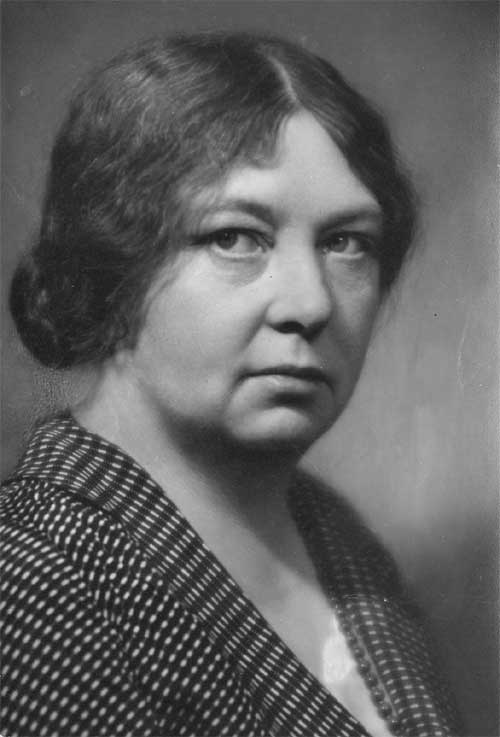 Nobel Prize winning Norwegian novelist , her works invoke the poignancy of the fall and the hope that is found in the act of redemptive suffering. “Ida Elisabeth” is a tremendous work. Great literature helps us practice the virtues. We may never encounter the situations the characters do, but watching how they navigate through the emotions and morals of the moments, help us to exercise our own virtues and responses to the underlying sin that propels the characters forward…and helps us to avoid recognize in some way the traps laid before us.
Nobel Prize winning Norwegian novelist , her works invoke the poignancy of the fall and the hope that is found in the act of redemptive suffering. “Ida Elisabeth” is a tremendous work. Great literature helps us practice the virtues. We may never encounter the situations the characters do, but watching how they navigate through the emotions and morals of the moments, help us to exercise our own virtues and responses to the underlying sin that propels the characters forward…and helps us to avoid recognize in some way the traps laid before us.
[powerpress]
 Vivian Dudro joins us once again to discuss Sigrid Undset, her life and her times, and some other works of this important author.
Vivian Dudro joins us once again to discuss Sigrid Undset, her life and her times, and some other works of this important author.
You can find the book here
“Undset is a realist in the truest sense of the word. She sees the real world in which people face the bitter consequences of selfish choices and in which suffering is unavoidable and yet potentially redemptive. In her acclaimed historical fiction, Undset shows us that the acceptance of suffering is the beginning of wisdom and also, paradoxically, the path to peace and lasting joy.”
- Joseph Pearce, Author, The Quest for Shakespeare
Tags: catholic, catholic podcast, catholic prayer, cathollc spirituality, ignatius press, joseph pearce, Sigrid Undset, suffering, works
This entry was posted on Monday, February 13th, 2012 at 10:38 am
You can follow any responses to this entry through the RSS 2.0 feed.

